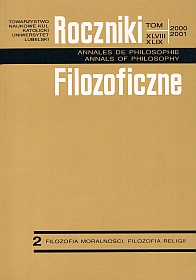Justification for Christian Beliefs: Peter van Inwagen and Fundamental Theology
Abstract
The article is focused on Theological Philosophy constructed by Peter van Inwagen and modern Fundamental Theology which has been cultivated at KUL. Both disciplines try to present reasonable justification for Christian fundamental convictions. P. van Inwagen − specially in his book God, Knowledge, and Mystery: Essays in Philosophical Theology − knowing well modern philosophy and the mentality of people living today tries to legitimate the main Christian beliefs. He writes about how Christians can justify the existence of personal God, he legitimates the authority of the Bible (which is questionable according to some scientific theories) and he defends the specific position of the Christian Church among other religions. In conclusion he suggests that Christian beliefs are not certain for non-Christians but it does not mean that they are not reasonable and acceptable. Fundamental Theology cultivated at KUL is very similiar to P. van Inwagen's project in some points. But in some other aspects his position should be deepened.
References
Bartnik Cz. S. ks.: Dogmatyka katolicka, t. I, Lublin: RW KUL 1999.
Dulles A.: Chrystus i Ewangelia. Warszawa: IW PAX 1971.
Gutowski P., Szubka T.: Przypadek, zło i ewolucja, „Znak”, 52(1998), nr 10, s. 151-160.
Hick J.: God and the Universe of Faiths, Oxford: Oneworld 1993.
Hick J.: Argumenty za istnieniem Boga, Kraków: Wydawnictwo Znak 1994.
Hooker M.: On Using the Wrong Tool, „Theology”, 75(1972), s. 570-581.
Inwagen P. van: God, Knowledge, and Mystery: Essays in Philosophical Theology, Ithaca−London: Cornell University Press 1995.
Kaucha K. ks.: Pluralistyczno-relatywistyczna teologia religii J. Hicka i P. F. Knittera, w: Chrześcijaństwo a religie, red. I. S. Ledwoń, K. Pek, Lublin− Warszawa: Wydawnictwo Księży Marianów 1999, s. 123-135.
Kopeć E. ks.: Teologia fundamentalna, Lublin: KUL 1976.
Kudasiewicz J. ks.: Jezus historii a Chrystus wiary, Lublin: RW KUL 1987.
Kudasiewicz J. ks.: Ipsissima verba Jesu, RT 43(1996), z. 2, s. 223-241.
Langkammer H. OFM: Metodologia Nowego Testamentu, Pelplin: Wydawnictwo Diecezjalne 1994.
L'unicità cristiana: un mito? Per una teologia pluralista delle religioni, red. J. Hick, P. F. Knitter, Assisi: Cittadella Editrice 1994.
Międzynarodowa Komisja Teologiczna, Chrześcijaństwo a religie, w: Chrześcijaństwo a religie, red. I. S. Ledwoń, K. Pek, Lublin−Warszawa: Wydawnictwo Księży Marianów 1999, s. 13-54.
Papieska Komisja Biblijna, Interpretacja Pisma Świętego w Kościele, Poznań: Pallottinum 1994.
Plantinga A.: Bóg, wolność i zło, Kraków: Wydawnictwo Znak 1995.
Ratzinger J. kard.: Wiara − między rozumem a uczuciem, „Ethos”, 1998, nr 4 (44), s. 59-72.
Rusecki M. ks.: Zadania apologetyki wobec teologii, CT 45(1975), fasc. 3, s.5-17.
Rusecki M. ks.: Ze współczesnej dyskusji nad przedmiotem apologetyki, STV 13(1975), fasc. 2, s. 35-43.
Rusecki M.: Fundamentalna teologia, w: Encyklopedia Katolicka, t. V, Lublin: TN KUL 1989, kol. 764-772.
Rusecki M. ks.: Wiarygodność chrześcijaństwa, t. I: Z teorii teologii fundamentalnej, Lublin: TN KUL 1994.
Rusecki M. ks.: Istota i geneza religii, wyd. II, Lublin−Sandomierz: Wydawnictwo Diecezjalne Sandomierz 1997.
Rusecki M. ks.: Elementy zbawcze w religiach pozachrześcijańskich, w: Odkupienie a dialog międzyreligijny. Materiały z sympozjum w Obrze, 20--21kwietnia 1998, Poznań 1999, s. 21-61.
Seweryniak H. ks.: Tożsamość teologii fundamentalnej dzisiaj, CT 66(1996), fasc. 3, s. 107-117.
Życiński J. abp: Inspiracje chrześcijańskie w powstaniu nauki nowożytnej, Lublin: RW KUL 2000.
Copyright (c) 2001 Roczniki Filozoficzne

This work is licensed under a Creative Commons Attribution-NonCommercial-NoDerivatives 4.0 International License.





